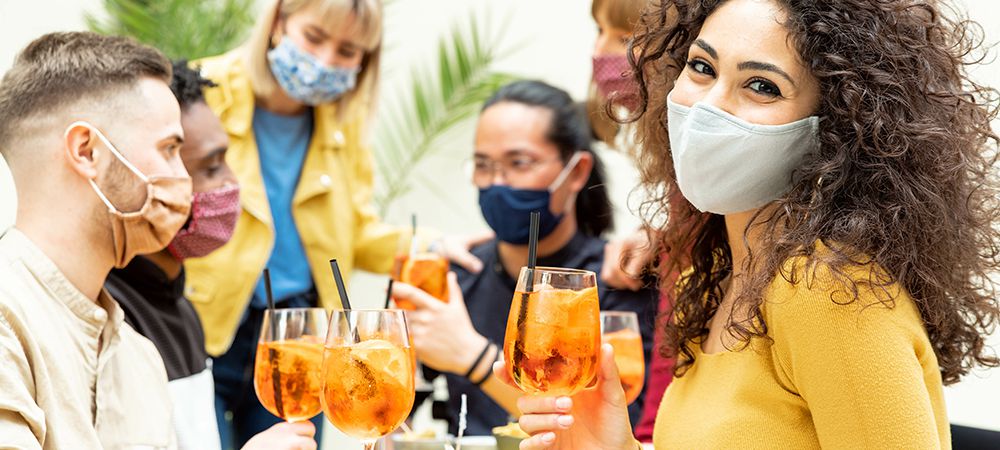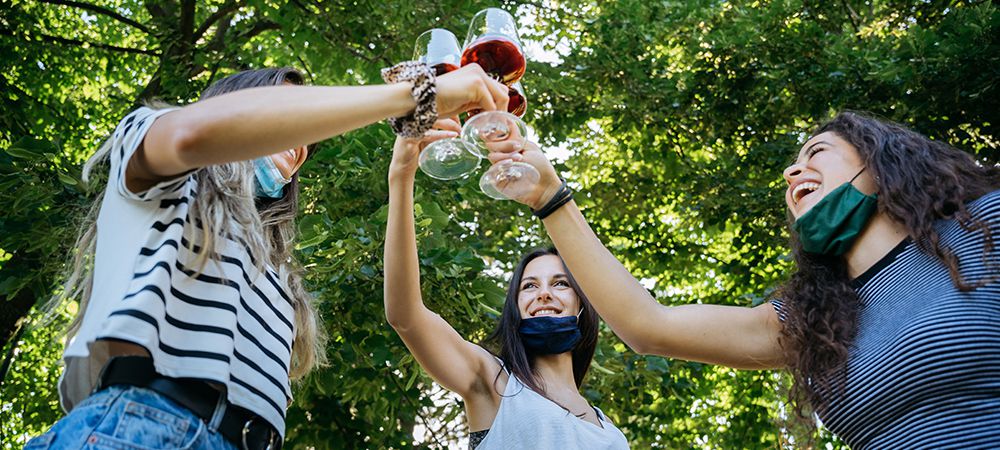
Can You Drink Alcohol After The COVID-19 Vaccine?
Almost two years after the onset of the COVID-19 pandemic, hundreds of millions of people are eager for life to return to some semblance of normality. Long stretches of isolation combined with job insecurity, and for many people, illness or bereavement, have left us feeling anxious, jaded, and tired.
The vast majority of medical experts and scientists agree that vaccination is the most reliable way out of the pandemic. At the time of writing, more than 42% of the global population have been fully vaccinated against COVID-19. This includes over three quarters of the Canadian population.
Although Canadian vaccination numbers are high, the vaccine program is far from over. Several thousand people have yet to be vaccinated, and those who previously received the vaccine are now lining up for the booster shots. A question that many are asking is whether it is safe to consume alcohol after receiving the vaccine.
How Does The COVID-19 Vaccine Work?
When you get infected with any virus, your immune system creates antibodies to fight that illness. By the time you have built up enough antibodies to mount an immune response, you may already be sick. For some illnesses, such as the common cold, this is not a big deal. For illnesses like COVID-19, the consequences can be dire.
The vaccine works by triggering the immune system to create the antibodies without you actually becoming infected. Although vaccine-acquired immunity can wane over time, it does not completely disappear, and the administration of booster shots ensures more robust long-term protection.
mRNA vaccines
Although there is a widespread perception that messenger RNA (mRNA) technology is new, scientists have been working with it for decades.
The vaccine takes the form of a small piece of messenger RNA that contains instructions to the cells as to how to create a spike protein that looks like the virus but is harmless. In response, the immune system makes antibodies. Within a few days, all components of the vaccine are gone from the body, but the antibodies remain. If you come into contact with the virus that causes COVID-19, the antibodies are already in place – so your immune system can immediately start destroying the viral particles without you becoming seriously ill. Most people who become infected after vaccination do not experience symptoms, and those who do generally have mild symptoms that do not require hospitalization.
mRNA vaccines include Pfizer and Moderna.
Viral vector vaccines
The viral vector vaccines work in much the same way as the mRNA vaccines, but instead of using mRNA to prompt the creation of the harmless spike protein, they use a fragment of a harmless virus. The virus used is not the one that causes COVID-19, so there is no risk of infection. When the vaccine is injected, the process of creating the spike protein and the antibodies are similar to that for the mRNA vaccines.
Viral vector vaccines include AstraZeneca and Johnson & Johnson.
Immune System Response
When your immune system starts making antibodies in response to the vaccine, it is gearing your body up for a fight. As it mounts a defense, you may experience some side effects, such as a low-grade fever, muscle aches, and enlarged lymph nodes. These symptoms are normal and nothing to be concerned about. They are simply your body’s way of telling you that the vaccine is doing its job.
What does alcohol have to do with it?

Clinical trials
All of the vaccines currently in use went through rigorous clinical trials, where some subjects were given the vaccine while others were given the placebo. The purpose of the clinical trials was to determine the effectiveness of the COVID-19 vaccine in becoming infected with the virus, experiencing severe illness as a result of said infection, and transmitting the virus to other people.
The use of alcohol during the clinical trials was not controlled. Subjects in the test and control groups were not given instructions to either consume or abstain from alcohol. Given the total number of people participating in the trials (more than 40,000 for the Pfizer vaccine alone), it is reasonable to assume that many did use alcohol in the days following the vaccine. Overall efficacy of the vaccine was shown to be high. If alcohol was a significant factor in reducing efficacy, this may not have been the case.
Does this mean alcohol is OK after a vaccine?
From an efficacy standpoint, alcohol is unlikely to have a significant effect. Your COVID-19 vaccine will not be less effective if you have a drink after receiving it. However, this is not the only consideration. As described above, the vaccine can come with side effects that vary in intensity from one person to the next. While alcohol may not impact the functioning of the vaccine itself, it could well exacerbate some of the side effects.
If you have an alcohol use disorder, your consumption of alcohol could already be affecting your circulation, heart rate, and respiration. The vaccine side effects can impact these things further, and the sum total of both could create complications.
Bearing in mind that this question has not undergone any peer reviewed scientific analysis, it is better to err on the side of caution. If you are planning to receive the COVID-19 vaccine, avoid drinking heavily. Reduce your alcohol consumption if it is safe for you to do so – remember that unsupervised withdrawal can be dangerous for people with alcohol addictions.
Talk to your doctor
This article does not replace the advice of a medical professional, and everybody is different. If you have an alcohol use disorder and you want to get the COVID-19 vaccine, your best course of action is to talk to a medical professional who can advise you on what is best for you.
Getting Help For Alcohol Addiction
If your alcohol consumption is problematic, Thousand Islands Rehab Centre can help. We offer customized addiction treatment programs that make use of a range of therapeutic methods. Your treatment may include individual, group and family therapy, yoga and meditation, exercise and nutrition counseling, life coaching, and much more. Call us today for more information.
